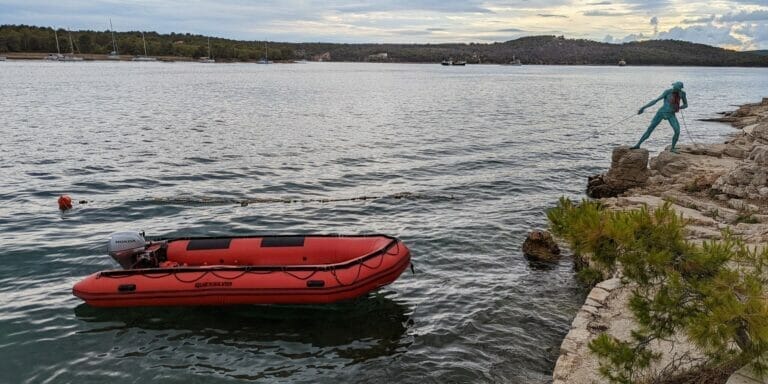The biggest fear of many boaters, especially those on circumnavigation or other long voyages, is to experience a pirate attack on the high seas. In addition, kidnappings involving ransom, robberies, burglaries, and thefts cause worries among crews. These worries are definitely not unfounded and therefore it makes sense to familiarize yourself with these risks and to prepare for them preventively. In the following, we would like to introduce you to the topic of maritime crime and give you practical tips on how you can minimize the risk of becoming a victim of these criminals.
The Risks
When it comes to maritime crime, people often talk about piracy, but this term is commonly defined in legal terms to refer only to attacks outside a country’s territorial waters. It is common, however, for modern piracy to include armed robbery at sea, that is, any illegal act of violence, detention, and depredation against vessels even within a country’s jurisdiction. In the following, we will also interpret the term piracy broadly by including armed robbery at sea.
However, of all criminal attacks, piracy on recreational boats, in contrast to commercial shipping, accounts for a relatively small proportion, as the majority are mere burglaries and thefts in which there is no direct escalation between victim and perpetrator.
Of course, you can fall victim to criminals anywhere in the world, but some areas are known to be particularly dangerous. Some of the known hotspots are, but not limited to the Gulf of Aden, the Somalian waters, the Gulf of Guinea, the Caribbean, and the South China Sea.

We don’t want to go much further into the question of risks at this point, because the fact that they are present should be clear to most of you. Much more important is the question of how you as a boater can optimally prepare yourself for possible criminal threats and how to behave in the event of an assault.
Minimize the Risks and Take Precautions
The risks of falling into the hands of criminals are undeniable, so you should try to minimize these risks as much as possible in advance and take certain precautions.
Do Not Expose Your Possessions Unnecessarily
Basically, you should try to attract as little attention as possible with your boat. The more you expose potential loot, the higher the risk that criminals will try to capture it.
Make sure that the deck and the side of your boat are as clear as possible, even in your eyes low-value items such as clothes can attract criminals to steal them.
Also try to protect the interior of the boat and the things there from prying eyes, for example, by closing the curtains when leaving the boat.
Generally, you should only have as few valuables on board as possible, and also the boat itself plays a central role in attracting criminals. Therefore, you should think twice about going on circumnavigation with a true luxury yacht, where you know in advance that you will be in high-risk areas for maritime crime. A more modest boat can actually provide much more comfort, namely in the form of more peace of mind.

Some also swear by intentionally defacing valuable items, such as the dinghy and its outboard, making them appear old and worthless. The rule of thumb is that you have achieved your goal when you pull up to the dock with your dinghy and feel ashamed of it. Only then will you no longer be a target for criminals….
Secure the Dinghy and Outboard
It is well known that dinghies and outboards are a popular target among criminals, as they offer an attractive ratio between high value and easy theft. However, the loss of a dinghy and/or outboard is not only a significant financial loss for you as a crew, but also from a practical point of view, as you are heavily dependent on these items in your daily life on board.
First of all, you should get into the habit of bringing the dinghy up on deck or pulling it up on the davit before you go to bed or leave the boat. This will make it much more difficult for the criminals to steal the dinghy and also the dinghy will not hit the side of your boat and disturb your sleep.
In addition, you should have a long enough chain with a suitable lock to secure the dinghy both to your boat and to the dock when going ashore. If necessary, you can also use the chain to secure your outboard. Make sure that the chain is strong enough so that it cannot be quickly broken with a bolt cutter. To prevent the chain from flying around loose in the dinghy, use a plastic basket, for example, in which you can stow the chain.

Also, you need to secure the outboard motor in some way. Special outboard locks can be used for this purpose, but sturdy bicycle or motorcycle locks are also suitable. As already mentioned, you can use the chain for your dinghy to secure the outboard as well.
Special outboard locks like this one from the manufacturer Allpa prevent thieves from quickly removing the outboard.
Speaking about outboards, we would like to mention that it may make sense to opt for a small 4 hp engine instead of a powerful 15 hp, since such small motors can really only be used for dinghies. More powerful engines, on the other hand, can be used for fishing boats as well, and in the eyes of criminals they are much more profitable stolen goods. However, a dinghy with 4 hp is of course not as much fun, but it’s definitely an interesting aspect you can think about.
Secure the Hatches and Companionway
To avoid being surprised by uninvited guests on board in the middle of the night, you should ensure that all hatches and the companionway are closed or somehow secured when in high-risk areas. Unfortunately, the climate in many such high-risk areas is also very hot and sleeping with the hatches closed is unthinkable for most people without air conditioning.
One possible solution to this problem is to install metal bars on the hatches and companionway that prevent people from easily accessing the inside but at the same time allow plenty of air into the boat. Such a solution, however, is primarily suitable for monohulls and less for catamarans, which usually have many, very large window areas that make the installation of bars practically impossible.
Quite apart from the aspect of ventilation at night, securing the access to your boat is also important when you leave the boat. Unfortunately, many access points are not well secured by design, so additional measures to secure them make sense.
Install an Alarm System
It makes sense to equip your boat with an alarm system that detects movement of uninvited guests and then triggers an acoustic (and possibly additional visual) alarm. Some systems also allow the alarm to be transmitted to a remote device, such as a smartphone, to inform the owner of the incident.
On the one hand, an alarm system allows the crew on board to become aware of uninvited guests early on, so that they can optimally prepare for a potential confrontation and request help in advance. On the other hand, the alarm also attracts the attention of other boats nearby regardless of whether you as a crew are aboard or not.
You may think that such an alarm system for boats is certainly very expensive, and the installation is complex, but we can comfort you. Besides dedicated, permanently installed alarm systems for yachts, which are indeed very expensive, you can also buy simple motion sensors with alarm function. Such systems are very cheap and usually do not even require a fixed installation as they are powered by batteries or integrated rechargeable batteries. These alarm systems are mostly universal and not marketed specifically for boats, and when buying you should of course pay attention to water resistance. Typically, a system consists of a base station and several motion sensors that are distributed around the boat. The motion sensors usually do not have to be permanently installed and can be flexibly positioned on the boat as desired. The big advantage is that you only need to place the sensors when you really need them, and the rest of the time you can store them away from the elements and curious eyes.

Equipment to Call for Help
In addition to the communication equipment that is carried on board as standard, you should always have at least one separate handheld VHF radio at hand. There are many situations where a handheld VHF radio is the only way to call for help. For example, the fixed radio will not help you if you are suddenly awakened from sleep in the middle of the night by intruders and you have no opportunity to get out of the cabin you are sleeping in. Moreover, if you are actually boarded by pirates on the high seas, you can assume that they will either take any communication devices and if that is not possible, they will destroy them. In many cases, the pirates will leave the boat after successfully looting it, and you will be glad to have a handheld VHF radio hidden somewhere on board, so that you are not left without any means of communication.
If you are near the coast and have mobile reception, make sure you have your cell phone handy and ready to call for help.
In addition, you should always be able to draw attention to yourself visually and acoustically in the event of an attack. For this purpose, marine distress signals such as signal rockets and flare guns, as well as light signals with strong LEDs are effective. Air horns can also be a good way to draw attention to yourself. If you like to throw boat parties with loud music anyway and therefore have powerful music systems on board, you can use them to acoustically attract attention and scare off intruders.
Just like we suggested with the handheld VHF radio, you need to make sure that you always have the equipment handy at various places on your boat, because you may be surprised by criminals and have no way to get to certain places on your boat in time.
Equipment for Self-Defense
Of course, you should always try not to get into the situation of direct confrontation, but in some circumstances, you will have no other option than to defend yourself. In order to be prepared for such a situation, it is worthwhile to think in advance about equipment that will make self-defense easier.
A common tool of self-defense is pepper spray, which has the advantages of being simple and cheap to purchase, easy to use, effective against most attackers, and widely legal. It is best suited for use below deck, at short range. Outdoors, on the other hand, pepper spray is definitely limited in its potential, as it is less effective at longer distances and also the risk of unfavorable wind conditions makes it difficult to use. We often hear about using wasp spray instead of pepper spray, but we can only advise against it. On the one hand, it may not work fast enough or at all, and on the other hand, it is not designed for self-defense and can cause long-term damage to people’s health. This may not deter some of you, because you are only using it for self-defense, but some judges will see it differently and you may end up in legal trouble.
Nightly attacks can also be countered by purposefully blinding the attacker, for example with a very bright spotlight or special strobe lights.
In some situations, it can also be helpful to defend yourself with a flare gun. We are aware of cases where the crew successfully fended off approaching attackers by firing flare guns at them. However, using flare guns for self-defense carries some risks. On the one hand, successful defense is anything but certain, and under certain circumstances, the attackers may respond with increased aggression if defending them unsuccessful. On the other hand, the use of a flare gun on your own boat can become a fire hazard and you may put yourself in danger by using it. We cannot make a general recommendation for self-defense with flare guns, because it depends on the situation and not too little on a good portion of luck. In addition, we do not recommend using adapters for flare guns that make it possible to shoot .38, 45LC/.410 or .22LR ammo. If you are caught with one of these, you may face worse consequences than if you were carrying a real firearm. We will go into more detail on the topic of firearms on board in a moment.
Another option for self-defense is, of course, the use of impact and stabbing weapons or objects that can be used for this purpose. From knives, machetes, clubs to smaller anchors, there are no limits to your creativity. However, always keep one thing in mind: any object can be lost by you in a confrontation to your opponent, who may then use it against you. For certain objects, it can therefore make sense to use a tight wrist strap to prevent them from being lost to your opponent. In general, it must be said that self-defense at short range should be avoided at all costs, because quite often such a confrontation turns out fatal.

For all types of self-defense, it is essential to practice them in advance in order to be able to act flawlessly and decisively when actually deployed. Successful self-defense requires a fair amount of brutality, which many people cannot exercise without the right preparation, and this emotional inhibition should not be underestimated.
Should I Carry a Firearm on Board?
Probably one of the most hotly debated questions regarding the defense against maritime crime is whether it makes sense to carry a firearm on board. To answer this question, we want to distinguish between two different cases. On the one hand, we consider the question under the condition that you intend to visit several different countries with your boat (e.g., as part of a circumnavigation). On the other hand, we look at the case where you are only sailing within the territorial waters of a single country. Why do we differentiate in this respect? Quite simply, because if you are sailing into the waters of another country, in most cases you will have to declare whether you are carrying a weapon when you clear in.

Case 1: Cross-border Cruising
In case one, that is visiting several different countries, we, as well as many other experienced skippers, are convinced that firearms on board usually do not make sense. Why? When clearing in a country, usually every firearm on board must be listed and, in many countries, these are then kept by the authorities for the duration of the stay and only when leaving the country, the weapon is handed over again. This clearing in of firearms is time consuming and nerve wracking, and often the firearm must be retrieved at the port of arrival, meaning you will lose a lot of flexibility in planning your cruise.
In addition, some people report that their handed-in weapons are not properly stored by the authorities and are sometimes returned rusted or with other damage. It also sometimes happens that the authorities shoot the gun around or even claim that the gun is “lost”. You surely know how criminal some authorities are…
What you also must keep in mind is that you don’t have access to your weapon within most territorial waters, but especially there you could need the weapon in case of possible criminal assaults. So, the usefulness of the weapon goes to zero if you clear in properly.
In short, the declaration of weapons provides stress, and effort/benefit are not in a healthy relationship with each other.
Now, some of you may come up with the idea to skip declaring the weapon and to hide it in case of an inspection. Our well-intentioned advice is: Don’t do it! Believe us, no matter how convinced you are of your hiding spot, authorities do boat searches every day and know even the smartest hiding spots. Moreover, inspections are rarely announced, so the question is how to find a safe hiding spot that you can also reach quickly in case of a criminal attack.
Even if you manage to successfully use the weapon for self-defense, how do you explain this to the authorities afterwards?
We encourage you to familiarize yourself with the penalties for bringing weapons into the country illegally. In numerous countries, you could end up in very uncomfortable prisons for many years, and sometimes even face death penalty.
No matter how you look at it, the illegal import of weapons is not recommended at all, because the potential legal consequences exceed the benefits many times over.
Case 2: Cruising Within a Country
Now let’s move on to case two, which is the case where you are limited to one country when cruising. Under this condition, it may make sense to carry a firearm for purposes of self-defense, if the respective country legally allows it. After all, since you’re not entering other countries, you don’t have to go through any annoying clearance procedures, and you always have access to your weapon to defend yourself in risky situations.
However, our experience shows that only a few people are in favor of carrying weapons on board even under these circumstances. Not even typical gun enthusiasts, who usually keep a gun in their glove compartment, choose to carry firearms on board. Shooting with firearms on a boat requires a great deal of skill on the part of the shooter, and in quite a few situations a firearm causes even more escalation instead of helping to de-escalate the situation.
In addition, most skippers do not want to limit themselves to one country and sooner or later want to cross national borders. If you are anyway only cruising in your domestic waters, then you will know all the better about potential dangers and can therefore also avoid them as far as possible. In that case, you will most likely never need a firearm, as you can avoid critical situations with criminals.
Nevertheless, there are certain reasonable scenarios in which skippers may choose to carry a firearm. If you ever decide to do so, it should go without saying that you train maritime use thoroughly so that you can use your weapon properly in an emergency without having to think twice.
Stash Artificial Valuables
In cases where a criminal attack on you is unavoidable, it has proven useful to have already prepared artificial valuables in advance. Most criminals will be looking to steal valuables, so it makes sense to have supposed valuables that aren’t actually that valuable on board to quickly give any criminals something to offer.
Suitable artificial valuables are old credit cards, old laptops, wallets with a little money, fake or costume jewelry, etc. Most perpetrators will already be satisfied with such items, because in these situations they themselves are stressed and have neither the ability, nor the time to determine the actual value of their loot.

Some of the artificial valuables you can leave discreetly in the boat, others you should hide to make things seem as authentic as possible.
Be Vigilant and Identify Risks Early On
The sooner you identify potential criminal attacks, the better you can respond to them and possibly even prevent them completely. This includes being vigilant, especially in high-risk areas, and trying to resolve any suspicious situations in a timely manner. In situations that cannot be clearly identified as a threat, it is better to be safe than sorry and to try to clarify the situation through proactive communication.
Remain Undetected in High-Risk Areas
Unfortunately, it is not always possible to avoid high-risk areas, but you can try to minimize the risks of being spotted when passing through such areas.
For one thing, it is recommended to pass through these passages at night, as this makes your boat much more difficult to spot. If necessary, you can also turn off all lights, including navigation lights, which will make you even more inconspicuous, though this brings its own dangers. However, try to avoid using white lights at all costs, as this makes you particularly easy to spot.

To be even more stealthy, you could also disable AIS and other navigation systems to avoid being detected by criminals. But again, this of course carries some risks of its own that need to be taken into consideration.
Cross High-Risk Areas Together With Others
When crossing high-risk areas, you also reduce the risk of becoming a victim of criminals significantly by not doing it all alone, but in company of other boats. This makes it much more difficult for any criminals and in many cases, they will not even try to attack you. Quite apart from reducing the criminal danger, group crossings are of course much safer in every other respect as well.
Plan Properly and Avoid High Risk Areas
Now we come to perhaps the most important aspect, proper planning, and avoidance of high-risk areas. In order to avoid high-risk areas when planning your route, you must first gather the most up-to-date information possible. When gathering information, you should try to use different sources of information and not just rely on one. One source of information are websites like IMB Piracy Reporting Centre, CSSN – Caribbean Safety and Security Net, or Noonsite. On the other hand, many governments also make recommendations and offer up-to-date situation reports. But probably the best sources of information are locals and the boating community. These sources of first-hand information are usually months ahead of any official reports, so we strongly advise you to gather local information in order to be up to date with the latest criminal developments when planning your trip.
After you have successfully gathered information, you can start planning your trip. Generally, it can be said that offshore routes are safer than routes along the coast. When planning your trip, you should also keep in mind to entrust your exact route only to people you really trust and not to make a big fuss about it. Because not only you plan your route, but also criminals do this and have their eyes and ears everywhere.
In addition, in some high-risk areas, it is a good idea to inform the local authorities, such as the coast guard or the navy, about your planned route in advance, if they offer this service.

And finally, you simply must listen to your gut feeling. If your intuition makes you feel unsafe in a certain region, listen to yourself, and leave it.
Recommendations for Action in the Event of a Confrontation
Even if you follow all the tips, we have described for avoiding criminal attacks, you cannot rule out the possibility that you will find yourself in a situation of direct confrontation with an attacker. If such a confrontation is unavoidable, there are some generally valid recommendations that we would like to share with you below.
First of all, you should scout out the attackers, if possible, from a safe position, to get an overview of the situation. Experience shows that the presence of more than two attackers is a strong indication of robbery, whereas teams of two and single perpetrators are more indicative of thieves and burglars. In robberies, the perpetrators are usually much more heavily armed, whereas thieves and burglars carry far less heavy weapons, sometimes none at all.
After you have gained an overview of the situation, you must sound the alarm quickly and with all means available. While it is not always possible to determine with certainty whether a threat is imminent, as some criminals initially present themselves as harmless, it is better to be safe than sorry in such unclear situations. In some circumstances, you can try to clarify critical situations by direct, proactive communication attempts. If this is not successful, it is better to sound the alarm.
We have already explained what equipment you should have on board to draw attention to yourself, but what is still important to emphasize is that the alarm should be maintained for as long as possible.
In addition, you must decide if you want to counteract the impending attack. This decision is particularly difficult because there is usually only little time to decide and of course your physical integrity is at stake. You must weigh whether you have a chance at all or whether a counterattack seems pointless anyway and would only escalate the risks to life and limb unnecessarily.
In fact, experience shows that if you resist, the risk of injury to the crew increases only minimally, whereas the probability that the criminals will unsuccessfully break off their attack increases significantly. Therefore, it may be worthwhile to resist, since most of the attackers are not heavily armed pirates, but simple thieves and burglars who try their luck and prefer to leave when they encounter resistance rather than let the situation escalate.
If you think you have a good chance of counterattacking and therefore decide to resist, you should act quickly, decisively, and rigorously. This is something that needs to be practiced and it is important that you finish the job. But be careful to respect the proportionality of your reaction, otherwise you could get into legal trouble in many countries. For example, shooting an unarmed teenage thief who tries to steal your dinghy is out of proportion and would be punished by most judges in the world.
In case you are inferior to the attackers and accordingly cannot prevent the criminal assault on you then, by all means follow what the attackers demand from you. Show yourself a little submissive and give the attackers the feeling of superiority, because this lowers their own nervousness and thus the danger for incalculable acts of violence against you. Quite often it is even possible to negotiate with the offenders and manage to get through the situation without violence.

Most of the attackers also want the confrontation to be over as soon as possible and will let you go after they have achieved what they want.
Don’t Drive Yourself Crazy
Finally, we want to encourage you not to be too frightened by the danger of maritime crime. It is right not to be naive, and you should take the risks seriously and prepare as we have described. However, also be aware that the probability of falling victim to a truly severe crime against you is extremely low and we actually think that living on board can be even less dangerous than living in the same country on land (we have already written on this in our post about the best reasons to become a liveaboard). Remember that the vast majority of all criminal incidents are harmless property crimes and violent crimes are extremely rare.
With that in mind, don’t drive yourself crazy and enjoy your boating freedom with a healthy dose of caution. And the rest of the unavoidable risk is, for better or worse, part of the adventure on the water, but also part of normal life!

Have you ever been a victim of maritime crime? Or do you have tips for preparing for and preventing criminal attacks at sea that we haven’t mentioned yet? Feel free to post a comment, we appreciate every single one and hope that together as a community we can make everyone’s boating life safer.











